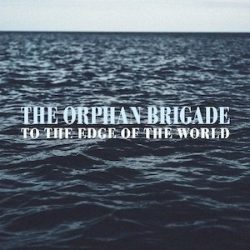
 The Orphan Brigade make location albums. The first in a haunted Kentucky mansion, the second in medieval Italian caves. Now comes the third, written and recorded on the wild Co. Antrim coast in Northern Ireland. This choice was led by band member Ben Glover, who was born in the village of Glenarm. The method was, armed with knowledge of local legend and geography, to wander and explore the coast, cliffs, ruins, bays etc writing songs on the go, then return to the village church of St Patrick’s, the site of which has been a place of worship since 1465,where local musicians collaborated with the recordings.
The Orphan Brigade make location albums. The first in a haunted Kentucky mansion, the second in medieval Italian caves. Now comes the third, written and recorded on the wild Co. Antrim coast in Northern Ireland. This choice was led by band member Ben Glover, who was born in the village of Glenarm. The method was, armed with knowledge of local legend and geography, to wander and explore the coast, cliffs, ruins, bays etc writing songs on the go, then return to the village church of St Patrick’s, the site of which has been a place of worship since 1465,where local musicians collaborated with the recordings.
So the album is thus full of songs with stories, pastoral, descriptive. The liner notes are extensive, telling the tale behind each song, even the precise location where they were written, for instance, ‘Children of Lir’ is about a druidic myth, and was written on a boat off coast in the Sea of Boyle. So the inspiration is manifest, but the product is thin? They spent four days writing the material, then three days making it coherent and recording. In ‘Banshee’, the talent and belief is clear, but the song has endless repeats of “whoo-whoo, hear the banshee cry”. ‘Fairhead’s Daughter’ seems to have endless “la la la’s”. There are two songs involving trees that just left me wanting to seek out ‘The Lightning Tree’ from Follyfoot to hear a distinctive, memorable tree song.
A comparator album to this would be The Waterboys’ ‘Fisherman’s Blues’, where Mike Scott decamped to Ireland to make an album steeped in locale and folklore, and ended up in the seaside village of Spiddal, where he surrounded himself with local musicians. But that process ended up taking two years, and 100 songs, of which the best dozen were carefully developed and expanded. If he had tried to do that whole project in a week, his album would have seemed interesting but stretched as well. None of the tracks on ‘To The Edge Of The World’ would have made it onto ‘Fisherman’s Blues’, though when he released all of the material recorded, tracks from this album could have fitted with his outtakes. Musicianship is high throughout, especially mandolin, and the multi-part harmonies strong, reflecting a remarkably high production value considering the time restriction.
This album is likely to appeal to the folk-scene, but for Americana fans, opening with UIlleann pipes is off putting, then going straight into a Bo Diddley beat for ‘Mad Man’s Window’, a song about a young man watching his sweetheart drown, is too jarring. Using the atonal infants choir from Ben Glover’s old school on the title track probably seemed like a good idea at the time? The treat is the slow waltz single of ‘Captain’s Song (Sorley Boy)’, about an infamous local 16th-century chieftain, where halfway in we hear the deep, strong and clear timbre of John Prine, singing with wonderful inflexion, backed with beautiful mandolin and chorus. Driving the stretch of coast road this album was made in is one of Britain’s greatest rewards, having this on the stereo could only enhance.



Good review but Antrim isn’t Britain!